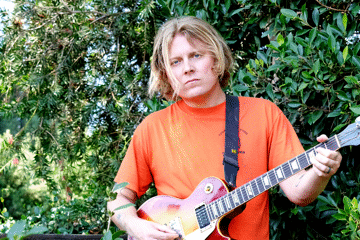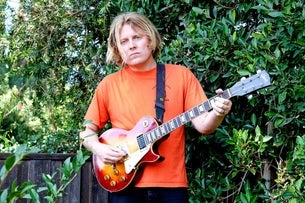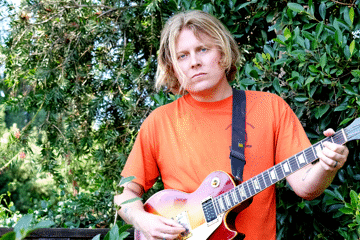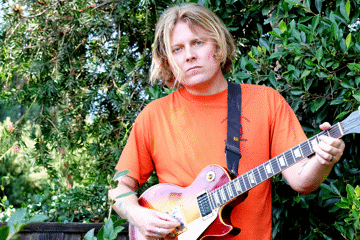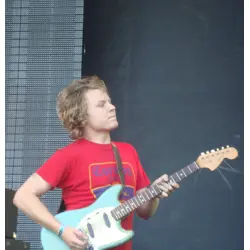 Ty Segall
Ty SegallSince dropping his eponymous debut long-player in 2008, Segall has not only released seven solo albums but contributed extensively to over a dozen more with bands such as Party Fowl, Fuzz and Sic Alps and collaborations with like-minded folks such as White Fence and Mikal Cronin. Many fans will attest that this prolificacy has done little to lower the calibre of his output, but Segall himself saw enough cause for concern to ease off the pedal for a change when it came time to write and record his new record, Manipulator.
“I just let the songs show me where the album was going to go,” he tells. “The only idea I had going into the record was that I wanted to take a long time doing it – really take as long as possible with it – and then the songs just kind of took over. I wanted to give myself a full year of writing, and a month in the studio. I wanted to have the biggest budget that I could possibly have so that I could spend the most time in the studio, because I’ve never actually done that before. It was fun.
“I was just, like, ‘Ok, I’ve put out a lot of music so far – which is great – but I’ve never focused on one album in a classic sense, like the way someone would from the ‘70s or whatever.’ So that was the idea, to do it like they would in a classic way – spend a month in the studio and get intense. So I lived above the studio for the whole month and we’d work from one in the afternoon until three or four in the morning, every day.”
Don't miss a beat with our FREE daily newsletter
Segall totally achieved the classic ‘70s sounds he was chasing on Manipulator, due partly to old school production techniques – eschewing later era digital reverb and dense guitar sounds – abetted by the gorgeous strings and organs which offset the guitars throughout.
“There’s definitely a specific era of music that I wouldn’t personally use their production methods, but I’m a fan of the tape echoes and the reverb tanks and all that stuff – it’s kind of like ‘If it’s not broke then don’t fix it,’” he smiles. “We were trying to go for a Tony Visconti-Bowie-Bolan-glam production – those early ‘70s records are just super-clean and bright, so shiny and pretty. A lot of people I know don’t like clean records – or wouldn’t record one – but I think if you do it the right way they’re like the coolest ones.”
"We were trying to go for a Tony Visconti-Bowie-Bolan-glam production – those early ‘70s records are just super-clean and bright, so shiny and pretty"
The exhaustive schedule pays handsome dividends when one listens to the strong songs, complex arrangements and rich textures which hold court throughout Manipulator – was the process arduous or enjoyable?
“It was both,” Segall muses, “but it was really, really intense just getting so much stuff done, especially as I played nearly everything on it so it was just constantly me doing takes, instead of in a band where it’s, like, ‘Alright, I play drums in this band so I don’t have to be around when the vocals are being done.’ It was very, very intense.”
His last album Sleeper (2013) was a totally different beast – favouring acoustic guitars and ambient arrangements – but Segall has no real inkling yet where his muse will take him next.
“Man, I have no idea what the next record will be all about. I don’t really want to do something that mellow again for a while – and I am enjoying playing loud music again – so I don’t really know. I’d love to go even harsher and louder… just keep going louder,” he chuckles. “I’m not sure though. I’d love to do a record with my band again, like a proper follow-up to the Slaughterhouse record [released in 2012 as The Ty Segall Band] – that would be fun.”
What exactly does Segall get out of playing everything himself on an album like Manipulator, rather than sharing the workload (and creative responsibilities) with bandmates?
“It’s just how I write most of the time. I write by demoing out all the parts – it is a kind of a specific style, but it’s just how I’ve always done it,” he ponders. “I dunno. I like playing the drums and stuff like that too, but it’s a totally different style to collaborating with someone. Both have their benefits totally, but I’ve been feeling that I need to collaborate with someone for the next record. Tim [Presley] from White Fence and I are talking about doing another collaborative record too, so the next thing’s going to be with Tim or with my band.”
Does Segall consider himself to be ambitious in the creative sense? Does he one day hope to construct a guitar-laden masterpiece?
“Yeah, I’d totally love to do something like that, but I don’t know – I feel like if you try too hard you can stomp out a good idea or something. This record is my first time dipping my foot into the pool of, like, ‘Ok, I’m spending time real time on a record,’ and doing that, and I’d like to delve even deeper into doing that someday,” he pauses before laughing deeply. “I feel like I really don’t know what I’m doing at all so far!”

